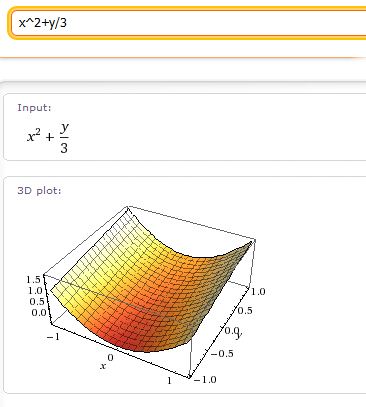Wolfram Alpha understands the questions
Wolfram Alpha is a search engine that understands questions, a knowledge engine that could be a better alternative to Wikipedia and Answers.
Although it is similar to a search engine, Wolfram Alpha wants to become a knowledge engine and is portrayed as a Wikipedia killer rather than a Google killer.

Question: What will the world be like in 2020?
In his presentation (link below), author Stefan Wolfram describes the engine as follows:
" What we're trying to do is collect everything that can be calculated on the world... and try to make such a package so that we can go to the site and get the knowledge there that we would like to get. Like interaction with an expert, he will understand what you are talking about, make calculations and present you with the results. "
The site has been open to the public since 18 May 2009.
The engine is provided in a free version with a paid version for backing up or posting collected data on the Internet.
It is only in English. It uses natural language, making translation into other languages difficult.
Rather, he specializes in the exact sciences.
Functioning
It is based on the Matematica tool, scientific simulation software whose code it repeats and runs on a network of 10,000 servers.
Queries are not a set of keywords, but questions that a program interprets through its natural language analysis engine. Search results are not lists of pages, as in Google, but direct information, with columns.
It uses graphics as important content and as such is very different from Wikipedia.
The toolbar allows you to ask questions to the engine at any time.

The software at the heart of Mathematica and the engine is a set of elementary programs, each of which processes several rules, and which combine everything together can simulate one of the forms of intelligence. Stephen Wolfram's work has always been based on the principle that complex systems should be developed on the basis of simple interacting elementary units.
Areas
The Knowledge Engine will be competent in the following areas thanks to data provided by Matematica:
- Astronomy: 155 thousand celestial tel.
- Biomedicine: 40,000 human genes (by 41 properties), 27,000 proteins .
- Finance: 186 thousand financial instruments.
- Linguistics: 149 thousand English words. 26 dictionaries of other languages .
- Mathematics: graphs (3000), geometric shapes (187 polyhedra), etc. .
- Physics.
- Chemistry: 34,000 compounds .
- Nutrition.
- Meteorology: 43 data provided 17 thousand stations around the world .
- Genealogy.
- Geopolitics: 237 countries (225 sites per country) and 160,000 cities . and
- others.
Openness to cooperation
In a post posted on the site's blog on August 20, 2009, Stephen Wolfram describes changes to the encyclopedic search engine, and finds that many users, abandoning Wikipedia, show a desire to actively participate in the project.
Therefore, the site is moving towards opening for external contributions.
Hundreds of millions of people have already used the engine, which encourages the team to change the code every week, to develop the project in different directions.
The first is the diversification of areas of knowledge. Many of them are on the lists, only over time they will be embodied in the data available on the site.
The second is understanding the issues. Many do not have answers, while the data is, simply because the interpretation engine did not understand them.
These questions that internet users ask are many examples of how the driving force is enriched. There are now 10% fewer questions that he cannot answer.
User requests, their proposals are registered and considered. According to the presented 54000 36000, they led to corrections.
The team believes that the project, which is progressing day by day, is on track to become the greatest repository of human knowledge!
Computer Document Format and API
Wolfram created a format for implementing interactive documents. It takes a CDF player to make it work. Then documents come to life, columns come to life and adapt to user questions, infographics develop. All areas of expertise can benefit from these live and interactive materials.
- KDF.
An API is also available for creating applications using the Wolfram knowledge base. The first commercial application is sold by the site itself, for the iPhone. It provides financial information or information in other areas that is structured and includes settlements.
Reactions
No direct reaction from Google, but in his annual letter to David Breen, one of the founders writes the following:
I think it will soon be possible to get a search engine that "understands " more questions and documents than we do today. Others say they did, however Google's systems behind the curtains have more intelligence than is clear externally, but the whole field is still in decline from what I expected.
Wolfram Alpha and Bing
On November 11, 2009, Microsoft announced the integration of Wolfram Alpha into Bing. Then you can ask questions and make decisions using a formula based on structured data.
- BMI calculation is provided virtually by each dietary site.
Conclusion
Wolfram uses a simplified search engine interface with a comprehensive page on a topic such as encyclopedia. The page is built according to the request and changes when the conditions change.
Its semi-legal aspect may limit its audience, but its interest lies primarily in its contribution to progress in access to knowledge, as well as in the principle that other open initiatives can generate.
Extension
You can try this formula:
(sqrt(cos(x))*cos(200*x)+sqrt(abs(x))-0.7) * (4-x *x)^0.01,sqrt(9-x^2),-sqrt(9-x^2)
Or the Batman curve.
Communications
- Tungsten Alpha.
- Simulation system. A tool for modeling reality based on pre-installed components with their integration function. For a free version, see Open Modelica.